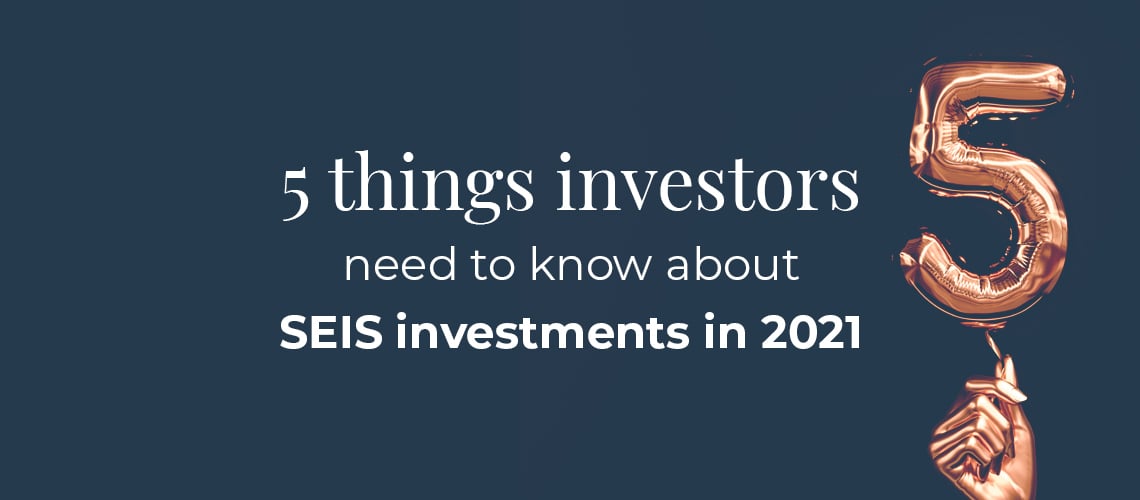5 things Investors need to know about SEIS investments in 2021
The UK has witnessed a considerable growth in start-ups founded over the last decade, with 672,890 new startups registered in the 2018/19 tax year alone – that’s 1,843 per day.
This burgeoning start-up culture has not only made way for a greater level of job creation, but has also greatly impacted the economic dynamism of the UK, with start-ups spurring innovation and injecting industries with competition and new ideas.
But whilst the benefit of start-ups to the economy is evident, such businesses can also pose as a lucrative opportunity to investors.
The Seed Enterprise Investment Scheme (SEIS) provides investors with an opportunity to invest in high-growth, early-stage start-ups whilst benefiting from some of the most generous tax reliefs available, including income tax relief of up to 50%.
Introduced in 2012 by HMRC, the scheme stimulates the creation and growth of early-stage start-ups by encouraging investment from individual investors, and facilitated over £163m of capital raised for 1,985 companies in 2018/19.
Unlike its sister scheme The Enterprise Investment Scheme (EIS), the SEIS focuses on especially early-stage start-ups and thus has an eligibility criteria designed to accommodate less established businesses (see point 4).
Consequently, the SEIS boasts considerably more generous tax reliefs for investors in order to offset the increased risks associated with investing in earlier-stage start-ups.
Here are five things investors need to know about SEIS investments in 2020.
1. The tax reliefs on offer with SEIS are among the most lucrative for investing into high-growth startups
The growing number of cuts to pensions and certain forms of tax relief witnessed over the years has led many experienced investors and high earners in particular to feel as though their capital is being gradually eroded.
In order to maximise returns and minimise risk, investing in a tax-efficient manner is crucial.
The tax reliefs available when investing into an SEIS-eligible business include:
- Income tax relief of up to 50%. This is applicable on a maximum annual investment of £100,000.
- 50% capital gains reinvestment relief. Provided you receive SEIS income tax relief, you can offset any other capital gains from the same year up to half the value of your investment.
- No capital gains tax on profits. You do not have to pay capital gains tax when selling SEIS shares as long as you have held them for at least three years, claimed income tax relief and the company is still SEIS-eligible.
- Inheritance tax relief. After being held for two years, SEIS investments are eligible for Business Relief and become inheritance tax-free.
- Loss relief. If your SEIS investment is realised at a loss, it can be offset against the same or previous year’s income tax.
2. SEIS investments can be made directly or via a fund
As an investor you can invest into SEIS-eligible investment opportunities via two channels: by investing directly into a single company, or through an SEIS fund, whereby a fund manager builds your portfolio on your behalf.
Each has their own advantages and disadvantages, and the best-suited option for you will be dependent on personal circumstances and your confidence in making investment decisions.
Where investing with the assistance of an EIS fund offers an element of diversification and can allow the investor to benefit directly from the fund manager’s expertise, this expertise comes at a price, meaning that using this route could lead to higher overall expenses.
Additionally, when investing through a fund, the investor has significantly less control over where their money is invested. In contrast to this, investing directly can offer investors greater freedom to select SEIS-eligible investment opportunities that better reflect the individual’s personal preferences.
3. Investing into an SEIS-eligible opportunity directly can provide greater freedom, transparency and control
Due to the fund manager’s role of selecting and collating suitable investments on behalf of the investor, investing via an SEIS fund often gives the investor less freedom over their portfolio split.
This shift in control over the distribution of funds can often be an aspect of investment funds that, experienced investors in particular, view as a disadvantage.
When investing directly, however, the investor has complete control over the distribution of funds. A portfolio can be specifically tailored around personal investment goals – choosing companies and opportunities that directly reflect personal circumstances and values.
This can reassure investors that their investment strategies are as consistent and transparent as possible, ultimately giving the investor the first and final say over where their capital is allocated.
For example, an investor who is particularly interested in supporting the growing interactive-tech sector, but also has a focus on climate change, could invest into a VR-based startup along with a sustainable house builder.
Though this route offers greater freedom and control over the portfolio, investors should be mindful that diversification is key – capital should be spread across a range of sectors and businesses to minimise downside risk.
To make this process easier, platforms such as Growth Capital Ventures’ (GCV) co-investment platform bring a selection of high-quality, SEIS-eligible investment opportunities from varying businesses and industries together in one place.
4. Investors can choose from a wide range of SEIS-eligible companies
When selecting SEIS-eligible companies to add to a portfolio, investors have the choice to invest in a broad range of industries, including everything from fintech, to retail, to construction.
But in order to be qualified as SEIS-eligible, a business must:
- Have less than 25 employees
- Be within 2 years of its first commercial sale
- Have total gross assets valued at no more than £200,000
- Not be a member of a partnership with another company
5. EIS and SEIS investments into tech start-ups could be crucial to a post-COVID bounce back
In the wake of the most widely documented pandemic of a generation, the pressure on start-ups to offer new, innovative solutions to previously novel problems has never been so crucial.
One industry that has addressed this need particularly successfully is the tech sector. With people cut adrift from the physical world, digital solutions have become increasingly important for both consumers and businesses to adapt to the ‘new normal’.
From video communications software such as Zoom, to guest self-service platforms like GCV Portfolio Company Qikserve, the pandemic has accelerated a growing thirst for tech – with the UK tech sector witnessing a 16% increase in new start-ups in the third quarter of 2020, whilst 72% of UK tech businesses experienced increased demand between March and August 2020.
As the tech sector is one of the few parts of the UK’s private sector to have performed well during the COVID-19 pandemic, this surge in demand has presented an opportunity not just for an economic bounce-back, but for investors to capitalise on high-growth, early-stage tech start-ups by taking advantage of the EIS and SEIS.
“Raising our economy’s productivity depends on supporting the growth of new and existing businesses, especially those in the growing tech sector.”
Head of Europe and Eurasia at the World Economic Forum, Martina Larkin, commented:
“Overall the (economic) recovery needs to focus on transformation – the digital transformation. We have to have some creative disruption in our economies, and entrepreneurs, start-ups and innovation will have a critical role to play in this process.”

%20(3)%20(2).jpg)











